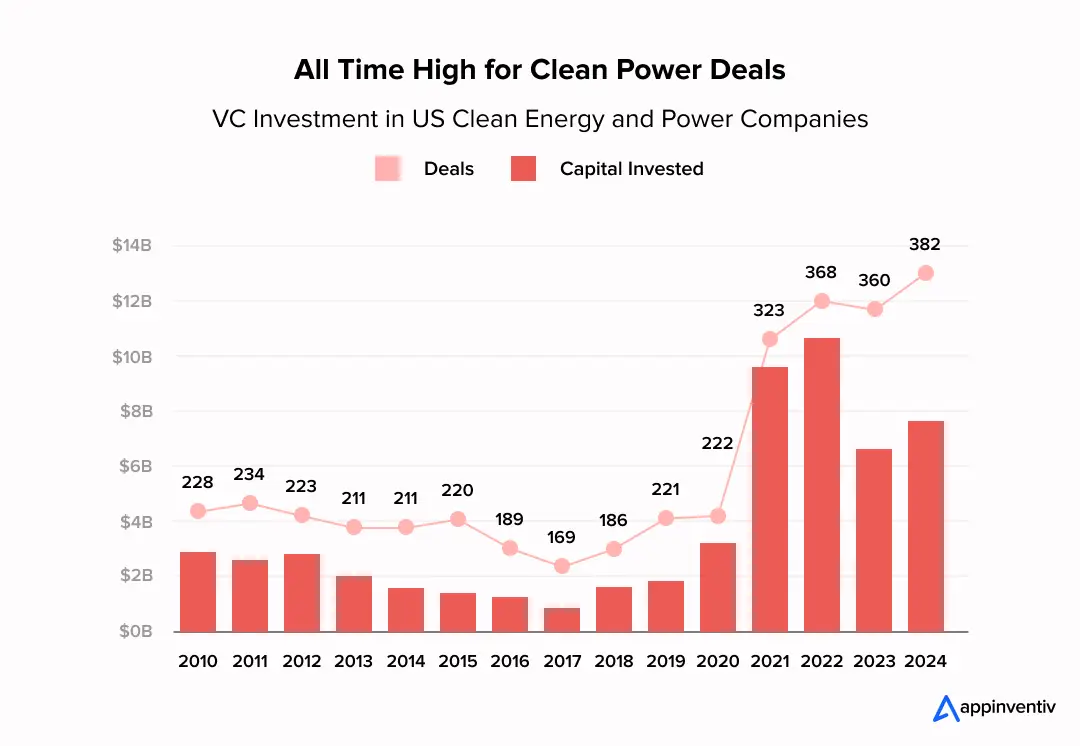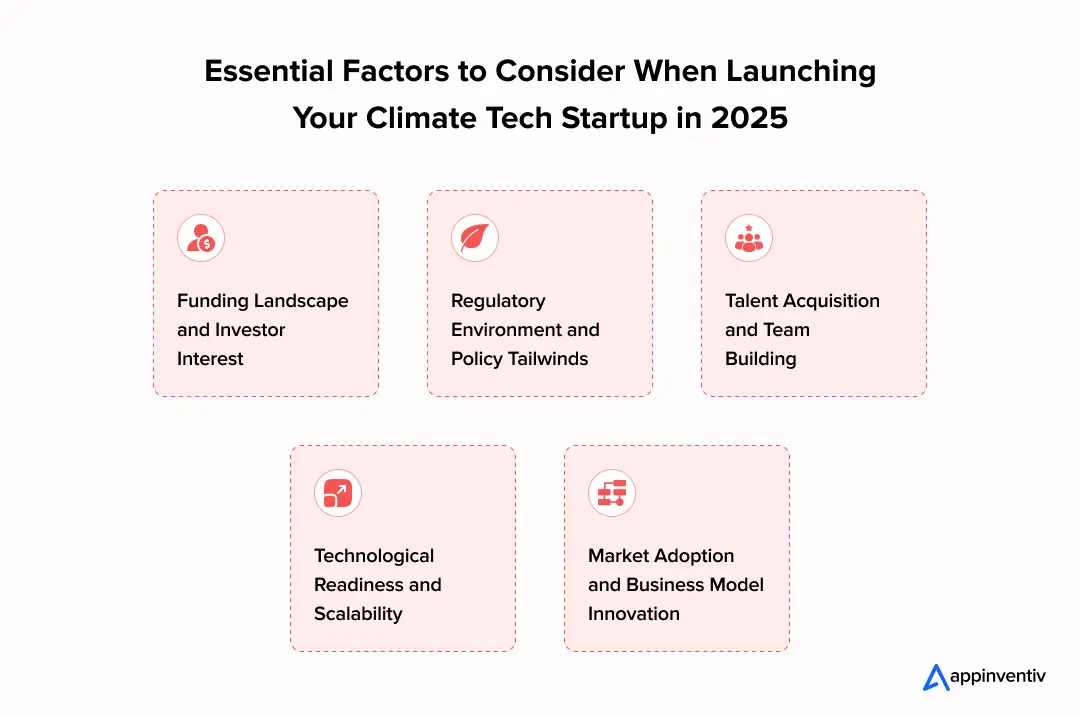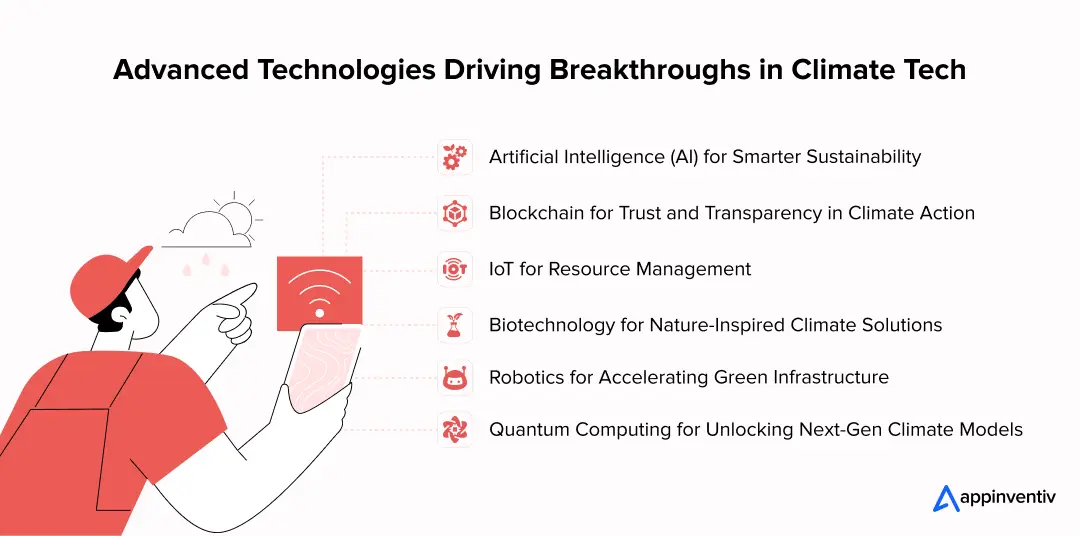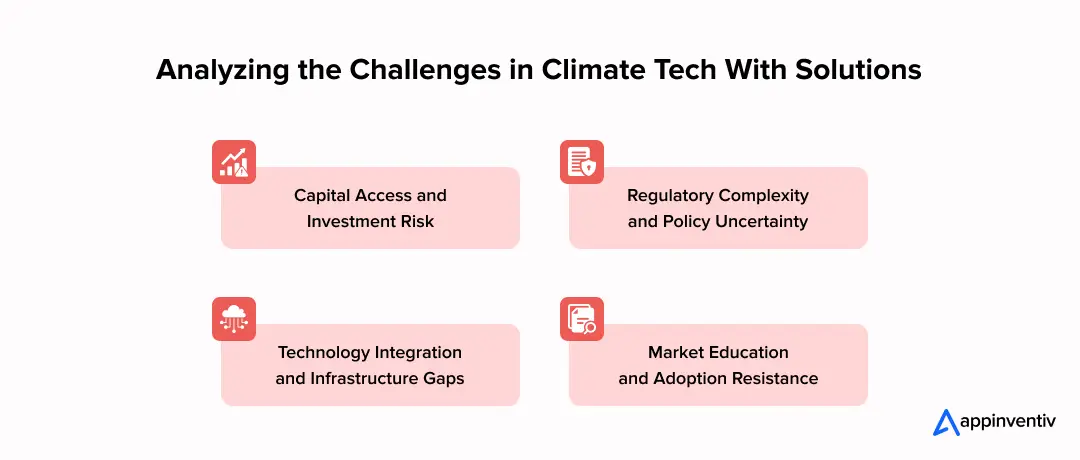- Understanding the Key Market Drivers for Climate Tech in 2026
- Top 10+ Climate Tech Startup Ideas for 2026
- Renewable Energy Optimization Platforms
- Carbon Capture and Utilization Solutions
- Sustainable Agriculture Tech
- Circular Economy Marketplaces
- EV Infrastructure and Battery Recycling
- Water Conservation and Management Tech
- Climate Risk and Sustainability Analytics
- Sustainable Packaging Solutions
- Clean Transportation Alternatives
- Energy-Efficient Building Solutions
- Bonus: Climate-Focused FinTech Solutions
- Key Considerations for Launching Your Climate Tech Startup in 2026
- Funding Landscape and Investor Interest
- Regulatory Environment and Policy Tailwinds
- Talent Acquisition and Team Building
- Technological Readiness and Scalability
- Market Adoption and Business Model Innovation
- How Emerging Technologies are Revolutionizing Climate Tech?
- Artificial Intelligence (AI) for Smarter Sustainability
- Blockchain for Trust and Transparency in Climate Action
- IoT for Resource Management
- Biotechnology for Nature-Inspired Climate Solutions
- Robotics for Accelerating Green Infrastructure
- Green AI Applications Development
- Quantum Computing for Unlocking Next-Gen Climate Models
- Overcoming Barriers to Climate Technology Adoption
- Capital Access and Investment Risk
- Regulatory Complexity and Policy Uncertainty
- Technology Integration and Infrastructure Gaps
- Market Education and Adoption Resistance
- Build the Future of Climate Tech with Appinventiv
- FAQs
Key Takeaways
- 2026 marks a pivotal year for climate tech founders, as 45% of Fortune Global 500 companies commit to net-zero targets and governments roll out climate-friendly policies, such as the U.S. Inflation Reduction Act.
- AI and deep tech are reshaping climate innovation, with growing investor interest in solutions like AI-powered energy forecasting, climate risk modeling, and carbon tracking tools.
- Success in climate tech requires more than innovation—startups need scalable technology, regulatory alignment, the right talent, and business models that integrate into existing systems.
- Emerging technologies, such as the Internet of Things (IoT), blockchain, biotechnology, and robotics, are driving smarter and more efficient climate solutions, enabling startups to address complex challenges at scale.
In 2024, global investment in the energy transition surpassed $2.1 trillion for the first time. This milestone reflects rising commitments to (Source: BloombergNEF)
- Electrified transport: $757 billion
- Renewables: $728 billion
- Power grid upgrades: $390 billion
While this breakthrough reflects growing momentum for clean energy and electrified transportation, funding for early-stage climate change and technology innovations, particularly in areas such as sustainable fuels and carbon removal, has slowed.
This gap presents a critical opportunity for new entrants to lead with bold, tech-driven solutions that go beyond traditional renewables.
Investors continue to find compelling opportunities in climate tech, as it drives a strong long-term outlook for the energy sector. According to Silicon Valley Bank, VC investment in Clean energy and power companies surpassed $7B in 2024. This is up 15% YoY and a more than 3x increase over pre-COVID-19 levels.
In parallel, the startup ecosystem is witnessing a pivotal shift. Investors initially drawn to the AI boom are now recognizing the convergence between artificial intelligence and climate technology. AI in the energy sector offers various solutions, including AI-driven grid optimization, climate modeling, and carbon tracking, which are creating powerful new business cases for cleantech startups. Founders who can harness deep tech to solve climate pain points are gaining an edge in both funding and market relevance.
For entrepreneurs, the signal is clear: the next wave of transformative businesses will be those that tackle climate change head-on. Whether through circular economy platforms, nature-inspired biotech, or energy innovation, the demand for scalable, sustainable startup ideas has never been higher. 2026 is poised to be a breakout year for climate tech founders ready to take the lead.
This blog presents over 10 climate tech startup ideas ready for 2026, each backed by strong market signals and viable technologies. It’s a must-read for CTOs, CMOs, CFOs, product leaders, and entrepreneurs committed to climate-focused innovation. We’ll also cover startup readiness, tech accelerators, and challenges, beginning with the drivers pushing climate tech forward. Let’s take a quick walk-through.
With 45% of global giants committing to net-zero by 2050, it’s your time to join the race.
Understanding the Key Market Drivers for Climate Tech in 2026
Climate tech startups operate across a wide ecosystem of environmental solutions, propelled by rapid advancements in climate change technology and the global urgency to decarbonize. This sector encompasses a range of areas, including renewable energy, carbon management, water technologies, sustainable agriculture, and other related fields. As the world moves towards a sustainable future, these environmental tech startups are essential in developing innovative solutions to reduce emissions and enhance resource efficiency.
Several key market drivers are fueling the growth of climate tech in 2026. According to Climate Impact Partners’ Annual Fortune Global 500 Report, 45% of the world’s largest companies now aim to achieve net-zero emissions by 2050, up from 39% last year and just 8% in 2020.

This reflects a growing commitment among major corporations to more ambitious climate targets.
Government policies also play a crucial role, such as the US Inflation Reduction Act, which allocates $370 billion in clean energy incentives in the upcoming years. Additionally, investor interest is steadily increasing, with climate tech startups receiving the largest share of global venture capital funding.
Top 10+ Climate Tech Startup Ideas for 2026
Investing in climate tech isn’t just about environmental impact; it’s about fulfilling one of the smartest long-term business strategies. With rising regulatory pressure and consumer demand for sustainability, now is the ideal time to align innovation with impact. Check out these top 10+ climate tech startup ideas poised to thrive in 2026 and beyond.

Renewable Energy Optimization Platforms
As renewable energy adoption increases, the complexity of managing intermittent supply becomes a major challenge. Startups using AI to forecast energy generation, optimize energy flows, and ensure grid stability are in high demand. These platforms help utilities better manage distributed energy resources, predict failures, and balance real-time demand and supply. Integrations with battery storage and demand response programs further improve energy resilience.
Real-Life Example: Startups like AutoGrid are already using AI to optimize distributed energy resources, helping utilities cut grid balancing costs and reduce emissions. These ideas support the integration of clean electricity and represent a thriving space for innovation.
Also Read: Renewable Energy Software: Why It Matters for Businesses and How to Build It Right
Carbon Capture and Utilization Solutions
Capturing CO₂ from industrial emitters and converting it into marketable products, such as synthetic fuels, concrete, or chemicals, offers a pathway to reduce emissions while generating revenue. Startups innovating in modular, low-cost, and scalable capture units are particularly well-positioned to succeed. The utilization of CO₂ for manufacturing aligns with net-zero strategies and creates new business models that focus on developing energy management systems for carbon neutrality.
Real-Life Example: Carbon Clean offers compact carbon capture technology tailored for industrial sectors, minimizing capital expenditures. Such startups represent some of the most impactful innovations in the global decarbonization effort against climate change.
Sustainable Agriculture Tech
Modern agriculture is evolving with the help of smart technologies that reduce environmental impact. Startups developing IoT-based precision farming tools, vertical farms, and AI-based agricultural crop monitoring systems can minimize water use, improve yields, and reduce emissions. Urban agriculture and controlled environment farming also provide sustainable food production models for densely populated cities.
Real-Life Example: At Appinventiv, we partnered with MAAN, an agri-education app designed to improve nutrition and promote sustainable farming in mountainous regions. We developed a digital platform that connects farmers, nutritionists, and agricultural experts to share knowledge and success stories.

Through a year-long collaboration, we delivered a scalable app that has evolved into a thriving community focused on promoting better nutrition practices. MAAN now plays a vital role in supporting informed agricultural decisions and improving nutritional outcomes across the NMA nations.
Circular Economy Marketplaces
Circular economy marketplaces are promising climate tech startup ideas that focus on transforming waste management and promoting sustainable practices. These platforms provide waste management software development capabilities that enable the reuse, resale, and recycling of materials, turning waste into valuable assets. By facilitating the exchange of resources, they reduce landfill dependency and promote sustainable consumption. Such startups help close the loop on materials, supporting a circular economy while lowering environmental impact.
Real-Life Example: For instance, Loop partners with major brands to develop reusable packaging and closed-loop logistics systems, aiming to reduce waste and promote sustainability. By replacing single-use materials with durable alternatives, Loop helps extend product lifecycles and minimize landfill impact. These initiatives encourage responsible consumption and support broader circular economy goals.
EV Infrastructure and Battery Recycling
The rise of electric vehicles creates an urgent need for charging stations and end-of-life battery management. Startups developing EV smart management software, fast-charging solutions, EV fleet management tools, and efficient battery recycling technologies can scale rapidly alongside the EV industry. Second-life battery use in energy storage systems is another promising angle.
Real-Life Example: Li-Cycle specializes in recovering valuable materials from lithium-ion batteries, thereby reducing e-waste and alleviating supply chain pressure. Such climate change innovations are critical to supporting the sustainable growth of electric transportation.
Water Conservation and Management Tech
As water scarcity becomes a growing global concern due to climate change, population growth, and industrial demand, IoT-based water management solutions are becoming increasingly critical. Startups are leading the way with innovations such as smart irrigation systems that respond to real-time soil and weather data, leak detection technologies that prevent water loss in infrastructure, and wastewater reuse systems. These solutions conserve water, enhance operational efficiency, and reduce environmental impact.
Real-Life Example: CropX, an agri-tech startup, uses IoT sensors and advanced soil analytics to deliver precise irrigation recommendations. By analyzing real-time soil moisture and environmental conditions, farmers can reduce water use by up to 25% while improving crop yields, a significant step toward achieving sustainable agriculture. Such technologies play a vital role in building climate resilience, guiding policy decisions, and promoting responsible water use across sectors.
Climate Risk and Sustainability Analytics
As climate risks escalate, organizations increasingly require intelligent tools to measure, predict, and mitigate their impact. Startups offering AI-powered climate solutions to track climate change, forecast climate risk, and provide regulatory compliance analytics. These solutions enable businesses to assess their exposure to climate-related threats, meet disclosure requirements, and align with global sustainability goals.
Real-Life Example: Jupiter Intelligence offers advanced climate risk modeling services to insurers, investors, and governments. Its platform utilizes science-based data to simulate the effects of extreme weather, sea-level rise, and heatwaves, enabling clients to make informed decisions about asset management and resilience planning. These platforms allow data-driven climate action, supporting long-term risk reduction and sustainable business strategies in an increasingly uncertain environmental landscape.
Sustainable Packaging Solutions
With growing awareness of plastic pollution and its devastating environmental impact, the demand for eco-friendly packaging solutions has reached an all-time high. Startups innovating with biodegradable, compostable, or bio-based materials are positioned to disrupt the traditional packaging industry by offering sustainable alternatives that reduce landfill waste and pollution. Additionally, smart packaging technologies that track product life cycles and enhance recyclability add significant value by improving transparency and consumer engagement.
Real-Life Example: Ecovative develops mushroom-based packaging materials that serve as biodegradable alternatives to plastic and Styrofoam. Their innovative, scalable solutions are being adopted across various industries to significantly reduce packaging waste and promote sustainability.
Clean Transportation Alternatives
Urban transportation is a major source of emissions and a significant contributor to air pollution and climate change. AI in transportation promotes sustainability by optimizing routes and reducing fuel consumption. Startups advancing shared electric mobility, hydrogen-powered vehicles, and mobility-as-a-service (MaaS) platforms are crucial in reducing urban pollution and congestion.
These solutions, when integrated with city planning and smart traffic management systems, can optimize traffic flow and further minimize environmental impact while improving accessibility and convenience for users.
Real-Life Example: Lime provides shared electric scooters and bikes that have displaced millions of short-distance car trips worldwide, promoting cleaner and more efficient urban travel. These ventures are at the forefront of green tech innovation, helping cities transition toward sustainable and resilient transportation networks.
Energy-Efficient Building Solutions
Buildings account for a massive share of global energy use and greenhouse gas emissions, making energy efficiency in this sector a critical priority. Startups developing smart windows, IoT-driven energy management systems like HVAC systems, and advanced retrofit insulation solutions are significantly reducing energy consumption in both residential and commercial spaces. Their innovations, combined with integration into building automation and real-time energy performance monitoring, enable more responsive and efficient energy management.
Real-Life Example: View Inc. develops dynamic glass that adjusts light and heat levels, significantly reducing HVAC loads. This sector offers scalable solutions for decarbonizing infrastructure and enhancing occupant comfort.
Bonus: Climate-Focused FinTech Solutions
Generative AI in Finance innovation is key to accelerating climate action by enabling new ways to fund sustainable projects. Startups creating carbon credit marketplaces, sustainability-linked financial products, and ESG scoring platforms provide transparent, efficient tools for tracking and verifying environmental impact.
These solutions foster trust through clear verification and traceability, enabling direct investment in climate-positive initiatives. By unlocking capital, they play a vital role in scaling the transition to a low-carbon economy.
Real-Life Example: Sylvera provides independent carbon credit ratings, helping buyers support credible and effective carbon offset projects. In 2026, this type of sustainability startup is gaining momentum as it combines innovation with purpose, addressing critical climate challenges while unlocking new economic value.
Key Considerations for Launching Your Climate Tech Startup in 2026
Launching a successful climate tech startup in 2026 requires more than just a brilliant idea. Here are critical factors for decision-makers to consider:

Funding Landscape and Investor Interest
The climate tech companies sector has seen a surge in investment, but securing funding still requires a compelling narrative and a robust business plan. Venture capitalists, corporate venture arms, and government grants are increasingly focused on climate solutions. Be prepared to articulate your impact, scalability, and financial viability clearly and concisely. Understand that investors are looking for the best climate tech startups with a clear path to market and a strong team.
Regulatory Environment and Policy Tailwinds
The regulatory landscape is a significant driver for climate tech startups. Staying informed about evolving climate policies, carbon pricing mechanisms, and incentives (like tax credits for renewable energy or carbon capture) in the US and globally is crucial. These policies can create significant market advantages or barriers. Navigating this environment effectively can be a key differentiator for top climate tech companies.
Talent Acquisition and Team Building
The demand for specialized talent in climate tech is high. Building a diverse team or hiring an AI developer with expertise in engineering, science, business development, and policy will be crucial to success. Consider forming partnerships with universities and research institutions to access cutting-edge research and tap into emerging talent. The right team can turn promising startup ideas for climate tech into thriving, impactful enterprises.
Technological Readiness and Scalability
While innovation is key, ensure your chosen climate change technology is mature enough for commercialization or has a clear roadmap to scalability. Demonstrating a viable path from pilot projects to large-scale deployment is essential for attracting investment and achieving widespread impact. Focus on solutions that can be industrialized and deployed rapidly to address the urgency of climate change.
Market Adoption and Business Model Innovation
Understanding your target market and developing a compelling business model is vital. Whether it’s B2B, B2C, or a hybrid, consider how your startup ideas for climate tech integrate into existing value chains, deliver measurable economic benefits to customers, and address adoption challenges. Explore innovative models, such as subscriptions, product-as-a-service, or strategic partnerships, to maximize impact and scalability.
How Emerging Technologies are Revolutionizing Climate Tech?
In 2026, advanced technologies are the backbone of breakthrough climate solutions, providing startups with the tools to optimize energy, enhance sustainability, and improve resilience. Their integration is driving more effective, scalable, and transparent climate action across industries worldwide.

Artificial Intelligence (AI) for Smarter Sustainability
Investing in green climate tech with AI today positions your startup at the forefront of innovation while addressing one of the world’s most urgent challenges. As technologies like AI in climate tech continue to revolutionize how we predict energy demand, manage emissions, and build climate resilience, the opportunity for impact and profitability has never been greater.
Blockchain for Trust and Transparency in Climate Action
Blockchain in the energy sector ensures transparency in carbon credit trading, emission tracking, and supply chain sustainability. It reduces fraud in offset markets, enables peer-to-peer energy trading, and builds trust in impact reporting. This makes blockchain a crucial technology for advancing startup ideas for climate tech that require credible, data-driven solutions.
IoT for Resource Management
The Internet of Things (IoT) connects sensors and devices that collect real-time environmental data, enabling precision monitoring of air and water quality, soil conditions, and industrial emissions. IoT also drives smart energy use in buildings and enhances waste management systems, making it essential for sustainability startups.
Biotechnology for Nature-Inspired Climate Solutions
Biotech is driving sustainable agriculture, low-impact food production (e.g., lab-grown meat and alternative proteins), and next-generation biofuels. These solutions reduce land use, methane emissions, and reliance on resource-intensive farming. Additionally, biotechnology enables the engineering of microbes and plants that can capture carbon more efficiently, contributing to natural carbon sequestration efforts.
Robotics for Accelerating Green Infrastructure
Automation technologies are increasing efficiency in recycling operations, infrastructure inspections, and solar panel maintenance. They reduce human error and operational costs, helping cleantech startups scale more quickly and safely. Moreover, robotics facilitates continuous monitoring and rapid repair of renewable energy assets, enhancing system reliability and lifespan.
Green AI Applications Development
Green AI Applications not only improve sustainability but also ensure a smarter approach to using data and algorithms to make informed decisions, which can have a profoundly positive impact on the planet. From cost savings to resource optimization to environmental conservation, Green app development has the potential to revolutionize other industries, such as healthcare, IT, Fintech, and parts of the energy sector.
Quantum Computing for Unlocking Next-Gen Climate Models
Still in its early stages, quantum computing holds transformative potential in solving complex climate challenges, from optimizing carbon capture processes to accelerating the discovery of new materials for clean energy technologies. Its unparalleled computational power could drastically improve climate prediction accuracy and optimize energy systems beyond the limits of classical computing.
Leverage our tech expertise to drive your sustainable scale-up.
Overcoming Barriers to Climate Technology Adoption
The transition to clean technologies faces significant hurdles, despite growing environmental urgency, the advancement of climate change, and technological innovation. From high upfront costs to regulatory uncertainties, multiple interconnected challenges slow the widespread deployment of climate solutions. Understanding and addressing these barriers is crucial for accelerating the global shift toward sustainable technologies.

Capital Access and Investment Risk
Climate tech startups face a notorious “valley of death” between initial research and commercial viability. Traditional venture capital often hesitates due to long development cycles, capital-intensive scaling requirements, and uncertain regulatory environments that make investment returns unpredictable.
Solutions: Innovative startup ideas for climate tech include developing climate-focused venture funds with patient capital models, creating platforms that connect climate entrepreneurs with impact investors, and building standardized assessment tools for climate tech investment risks. Startups can also explore revenue-based financing models and crowdfunding platforms specifically designed for environmental technologies.
Regulatory Complexity and Policy Uncertainty
Climate tech startups must navigate inconsistent policies across different markets while dealing with lengthy approval processes that can span years. This regulatory maze particularly affects energy, transportation, and industrial applications where safety and environmental standards are stringent.
Solutions: Climate change startup opportunities lie in developing RegTech solutions that streamline compliance for climate-focused companies, making it easier to meet evolving environmental regulations. Climate technology startup ideas could include developing AI-powered policy tracking systems, automated compliance monitoring tools, and platforms that streamline environmental permitting processes across multiple jurisdictions.
Technology Integration and Infrastructure Gaps
Many promising climate technologies struggle to integrate with existing infrastructure, from outdated electrical grids to industrial processes designed for fossil fuel inputs. This integration challenge creates significant barriers for both technology developers and potential adopters.
Solutions: Smart climate tech startup ideas focus on developing middleware solutions that enable seamless integration between new climate technologies and legacy systems. Opportunities include creating modular retrofitting solutions, developing universal interfaces for renewable energy systems, and building software platforms that optimize the interaction between traditional and emerging clean technologies.
Market Education and Adoption Resistance
Despite growing environmental awareness, many potential users remain hesitant to adopt climate technologies due to perceived complexity, concerns about reliability, or a lack of understanding regarding the long-term benefits. This adoption gap is particularly pronounced in B2B markets where decision-making processes are complex.
Solutions: Current climate tech trends reveal a significant opportunity for startups that prioritize user experience and market education. Innovative approaches include developing climate tech marketplace platforms with transparent performance data, creating “tech-as-a-service” models that reduce adoption risk, and building digital tools that demonstrate real-time environmental and economic benefits to end users.
Build the Future of Climate Tech with Appinventiv
As the world accelerates toward a low-carbon future, the opportunity to lead with impactful, tech-driven solutions has never been greater. Whether you’re exploring clean tech startup ideas or ready to scale your climate innovation, success lies in turning bold visions into reliable, real-world applications. This is where Appinventiv steps in as your strategic partner for startup app development services.
- At Appinventiv, we’ve empowered global giants like Domino’s, KFC, Pizza Hut, IKEA, and Adidas to digitally transform their customer experiences and backend operations for better performance and sustainability.
- We’ve also helped pioneering startups like EdFundo (a fintech platform teaching kids financial literacy), MAAN (a wellness tech brand), AVATUS (a cutting-edge logistics solution), and Edamama (a parenting and e-commerce platform) turn their product ideas into scalable, user-focused digital solutions.
If you’re ready to bring your climate tech startup idea to life, partner with a team that blends innovation with execution. We are prepared to bring your environmental startup ideas to life, building high-performing solutions that drive real impact for your business and the planet.
Get in touch with our experts today!
FAQs
Q. What is the future of clean tech startups?
A. The future of cleantech startups is promising, driven by global efforts to achieve net-zero goals and supported by strong policy initiatives, such as the U.S. Inflation Reduction Act and the EU Green Deal. As demand for sustainable solutions rises, clean tech startup ideas in areas such as renewable energy, carbon capture, waste management, and green transportation are gaining momentum.
Climate tech startup ideas are gaining momentum as emerging technologies like AI, IoT, and blockchain drive rapid innovation. These tools enable smarter energy systems, real-time emissions monitoring, and data-driven sustainability strategies. As the world shifts toward decentralized solutions like microgrids and gains broader access to green finance, climate tech startups are uniquely positioned to scale quickly and deliver measurable environmental impact.
Q. Which climate tech sectors are booming in 2026?
A. Here are the booming climate tech sectors in 2026:
- Clean Energy: Climate change innovations in solar, wind, and energy storage are accelerating the global shift to renewable power.
- Carbon Capture and Removal: Startups are scaling solutions like direct air capture and biochar to meet rising carbon offset demands.
- Electric Transportation & Mobility: EV infrastructure and electric fleet tech are revolutionizing how goods and people move sustainably.
- Climate-Smart Agriculture: Tech-enabled farming methods are boosting yields while reducing environmental impact.
- Climate Fintech: Digital tools for ESG investing and carbon tracking empower greener financial decisions.
- Water and Waste Tech: Waste management solutions are turning waste into energy and making water use more efficient.
- Climate Risk and Resilience Analytics: AI-powered platforms help predict and manage climate-related risks for cities and businesses.
Q. What are the emerging technologies for climate change?
A. Emerging technologies for climate change are innovative tools and solutions designed to reduce greenhouse gas emissions, enhance sustainability, and help adapt to environmental impacts. Key technologies include:
- Artificial Intelligence (AI)
- Internet of Things (IoT)
- Blockchain
- Green Hydrogen
- Direct Air Capture
- Advanced Materials
- Biotechnology
- Robotics and Automation
- Quantum Computing
Q. How do I get funding for a green tech startup?
A. Here’s a step-by-step approach to help you attract the right funding for your green technology venture or climate technology startup ideas:
- Develop a clear and impactful business plan
- Identify relevant funding sources
- Build a strong network
- Prepare a convincing pitch
- Leverage government incentives and grants
- Consider crowdfunding and strategic partnerships
Q. What are some of the top climate tech trends?
A. Here are some of the top climate tech trends shaping the industry in 2026:
- AI and Machine Learning
- Renewable Energy Innovations
- Carbon Capture and Utilization
- Circular Economy Solutions
- Electric and Sustainable Mobility
- Decentralized Energy Systems
- Climate Adaptation Tech


- In just 2 mins you will get a response
- Your idea is 100% protected by our Non Disclosure Agreement.

10 Future-Ready Tech Business Ideas to Launch in Brisbane (2026 Edition)
Key takeaways: Brisbane’s Tech Surge: With $10.8B in value and 81% growth, Brisbane offers strong government backing, top talent, and global reach. Funding Boost: Programs like Advance Queensland have funded 8,100+ startups with up to $250K each. Scalable Sectors: AI healthcare, AgTech, and renewables thrive with solid R&D and industry support. Brisbane is buzzing with…

16 Game-Changing Startup Ideas in the UAE You Haven’t Considered Yet
Key takeaways: The UAE's strategic location and government support make it an ideal startup hub. AI, fintech, and green tech are booming sectors with vast opportunities for startups. Over $11 billion in funding is fueling growth in key industries like AI and e-commerce. Government initiatives like the “Dubai Future District Fund” support entrepreneurial growth. Niche…

10 Innovative Business Ideas in the Oil and Gas Industry for 2026
The oil and gas industry is in the midst of a high-stakes digital revolution. With rising global energy demands, increasing pressure to reduce emissions, and the complexity of upstream and downstream operations, enterprises are turning to software-first solutions to stay competitive. In 2026, this shift is not just a matter of time; it's transformative. According…




































